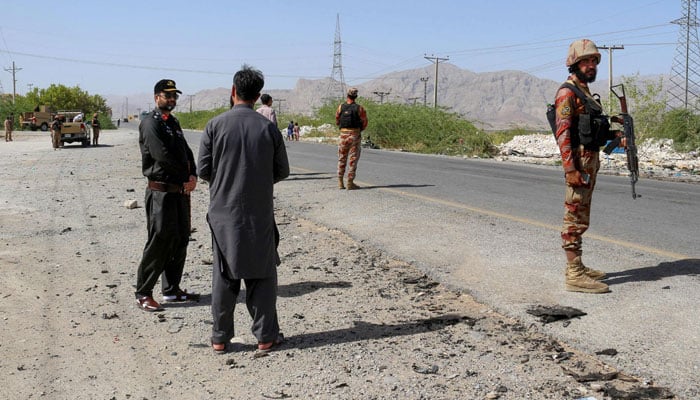The smallest coffins
Government has stated that Indian-backed militants were behind Khuzdar attack
On Thursday, Pakistan mourned the death of a 12-year-old student who succumbed to injuries sustained in Wednesday’s horrific terrorist assault on a school bus in Khuzdar carrying over 40 students to their educational institute. The blast martyred five individuals on the spot, including three innocent children, and left dozens injured – five of whom remain in critical condition. This cowardly act has drawn widespread condemnation from across the country and the international community. And rightly so. The deliberate targeting of children is a line crossed – a crime that reminds us of the darkest chapters in our history: the 2014 Army Public School (APS) attack in Peshawar. Like then, this atrocity is a direct assault on our future and must be treated as a declaration of war against the nation’s conscience. Prime Minister Shehbaz Sharif visited Quetta following the attack, accompanied by COAS Field Marshal Asim Munir and senior cabinet members. The prime minister and the army chief have made it clear: the time has come for Pakistan to exhibit unwavering national resolve, similar to the unity shown during previous episodes of Indian aggression.
The government has stated that Indian-backed militants were behind the Khuzdar attack, which comes less than two weeks after both countries agreed to a ceasefire following their most serious conflict in decades. It is no secret that terrorist outfits such as the Balochistan Liberation Army (BLA), often operating in collusion with Indian intelligence, have worked relentlessly to destabilise Pakistan. From the hijacking of the Jaffar Express to repeated attacks on Chinese nationals and our security forces, their modus operandi has become increasingly ruthless. The Khuzdar attack is the next step of an outfit that is too far gone. Much like the TTP, the BLA has shown that it will target anyone to spread fear – even children. This is calculated terrorism and the message is clear: these groups, and their foreign backers, will go to any lengths to sow chaos.
Let us also be clear on another point: equating Baloch grievances with the actions of the BLA is both inaccurate and dangerous. The people of Balochistan have long-standing, legitimate concerns that must be addressed through political dialogue and inclusive governance. These grievances must not be confused with the violent extremism of militant outfits. In fact, the people of Balochistan have consistently condemned attacks on security forces, civilians and foreign allies such as China. It is the terrorists, and not the people, who are working to undermine Pakistan’s sovereignty. The international community must not turn a blind eye to this growing threat. The arrest of Indian spy Kulbhushan Jadhav from Balochistan in 2016 remains irrefutable evidence of India’s involvement in subversive activities within our borders. Many observers had warned, following Pakistan’s strong military response in the recent Indo-Pak conflict, that Indian-affiliated terrorist organisations would resort to more vicious acts. It is time for Pakistan’s diplomatic channels to act with urgency. The world must understand that what we face is not just terrorism; it is state-sponsored terror aimed at destabilising our country and the region. The lives lost in Khuzdar, especially those of innocent children, must not become just another statistic. They must serve as the turning point for a comprehensive national strategy – military, diplomatic, political – to uproot terrorism in all its forms.
-
 Caleb McLaughlin Shares His Resume For This Major Role
Caleb McLaughlin Shares His Resume For This Major Role -
 King Charles Carries With ‘dignity’ As Andrew Lets Down
King Charles Carries With ‘dignity’ As Andrew Lets Down -
 Brooklyn Beckham Covers Up More Tattoos Linked To His Family Amid Rift
Brooklyn Beckham Covers Up More Tattoos Linked To His Family Amid Rift -
 Shamed Andrew Agreed To ‘go Quietly’ If King Protects Daughters
Shamed Andrew Agreed To ‘go Quietly’ If King Protects Daughters -
 Candace Cameron Bure Says She’s Supporting Lori Loughlin After Separation From Mossimo Giannulli
Candace Cameron Bure Says She’s Supporting Lori Loughlin After Separation From Mossimo Giannulli -
 Princess Beatrice, Eugenie Are ‘not Innocent’ In Epstein Drama
Princess Beatrice, Eugenie Are ‘not Innocent’ In Epstein Drama -
 Reese Witherspoon Goes 'boss' Mode On 'Legally Blonde' Prequel
Reese Witherspoon Goes 'boss' Mode On 'Legally Blonde' Prequel -
 Chris Hemsworth And Elsa Pataky Open Up About Raising Their Three Children In Australia
Chris Hemsworth And Elsa Pataky Open Up About Raising Their Three Children In Australia -
 Record Set Straight On King Charles’ Reason For Financially Supporting Andrew And Not Harry
Record Set Straight On King Charles’ Reason For Financially Supporting Andrew And Not Harry -
 Michael Douglas Breaks Silence On Jack Nicholson's Constant Teasing
Michael Douglas Breaks Silence On Jack Nicholson's Constant Teasing -
 How Prince Edward Was ‘bullied’ By Brother Andrew Mountbatten Windsor
How Prince Edward Was ‘bullied’ By Brother Andrew Mountbatten Windsor -
 'Kryptonite' Singer Brad Arnold Loses Battle With Cancer
'Kryptonite' Singer Brad Arnold Loses Battle With Cancer -
 Gabourey Sidibe Gets Candid About Balancing Motherhood And Career
Gabourey Sidibe Gets Candid About Balancing Motherhood And Career -
 Katherine Schwarzenegger Shares Sweet Detail From Early Romance Days With Chris Pratt
Katherine Schwarzenegger Shares Sweet Detail From Early Romance Days With Chris Pratt -
 Jennifer Hudson Gets Candid About Kelly Clarkson Calling It Day From Her Show
Jennifer Hudson Gets Candid About Kelly Clarkson Calling It Day From Her Show -
 Princess Diana, Sarah Ferguson Intense Rivalry Laid Bare
Princess Diana, Sarah Ferguson Intense Rivalry Laid Bare




